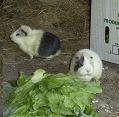 |
Bungala Ridge Permaculture Gardens REDUCE ... REUSE ... RECYCLE ... REPAIR ... RETURN ... REVEGETATE ... REPLENISH |
|||||||||||||
|
||||||||||||||
|
|
Target Carbon Neutral - A Personal Lifestyle and Household Goal Years ago Robin talked wistfully about building an electric car. We were both a little excited to pick up a Suzuki Hatch for $500 a few years ago, but wore it out, driving it to and from work every week as well as using it as our regular workhorse around the property. We ventured into Subaru territory and then finally purchased a Toyota Hilux with a diesel engine. Robin's electric car ambitions, you see, had been side-stepped in favour of investigating making our own biodiesel. To this end I bought him the book From the Fryer to the Fuel Tank, the complete guide to using vegetable oil as an alternative fuel by Joshua Ticknell. Time passed. It does that. Global warming became an established fact. We watched Al Gore's An Inconvenient Truth (read my article in March issue of Homeschool Australia newsletter). Guilt drives us now - knowing what we do - what we did already! - how can we procrastinate any further? It's a lot like my promise to myself to lose weight, get fit, eat well, live a healthy lifestyle... What is wrong with us??? Apathy kills. It's time to kill apathy! Our Trees For Life newsletter introduced us to the Carbon Neutral. Here's a bit from the blurb on their website:
Carbon Neutral offers to plant trees on your behalf to help offset your emissions. There's a donation button that makes this whole process easy. Without signing up, we were inspired to do a carbon emissions audit on our lifestyle, set 0 as our target, and brainstorm some strategies to reach it. This isn't going to be easy... but I don't think our past transgressions have taken any kind of choice we may have had away... Step 1. Using a carbon neutral calculator to find out what we're emitting today. We picked the Carbon Neutral Company calculator, even though it's set for the UK and we had to convert pounds into dollars. I've since heard that this site isn't at all recommended, but it was the calculator we used, so I've left the link. You might be able to find a better one. I was interested to see how different calculators rated us, but more on that later. The CNC has three calculators: one for driving, one for flights (not applicable in our case) and one for households. Here's how we shaped up:
We gave the calculator at Elementree at whirl and it produced these figures:
Origin Energy gave us these figures (I'm doing my best to compare apples with apples with each of these calculators...):
Okay... now to add the emission from our woodstove, which not only heats the house but also our water for showering, washing dishes, etc. We wash our clothes using cold water, of course. According to the Cool It! Greenhouse Gas Emissions Calculator;
This means, at best, our wood burning emissions are zero because we source all of our firewood from our property or use scrap timber that would otherwise have gone to landfill. The firewood on our property either comes from fallen branches or trees that we grew and planted ourselves. At worst, using the formula above then we emit 2.3 tonnes of CO2 using our woodstove. This allows for an average of 6 -8 hours burning each day for four months. We tend to use clothes and blankets to keep warm in the evening and usually only light the fire after 4pm, always mindful of the emissions issue. So... let's add that all up, shall we? Using the worst figures, to be on the conservative side:
According to Carbon Neutral our usage would require that 18 trees a year... I find that hard to believe. We've planted thousands of trees in the last two decades so I guess we've well and truly paid for the carbon we've emitted in our life time. If only life weren't so complicated... Our western lifestyle eats carbon for breakfast. It's not just the fuel we use in our cars or the wood we burn in our stoves or gas we use in our cookers or water heaters... Everything we buy was made using tons and tons of fuel. I'd hate to calculate that into the equation. But perhaps we need to... Time to take a look at our ecological footprint again... If anyone knows of a carbon emissions calculator that takes into account the type of food one eats, the type of house one lives in, the materials it was built with, type and number of possessions, etc, I'd love to play with it one day - email me the details please. Ta.
The target: to go carbon neutral as soon as possible How do we do that? One way is to reduce the energy we consume. Obviously we don't want to alter our lifestyle in any drastic way: we enjoy our life up here on the hill overlooking the serene Bungala River valley. Here's the plan:
It's got to mean, and be, a lot more than what's offered on mycarbondebt.com where you can buy gift vouchers as 'thoughtful and sustainable gifts' to help offset emissions. You'll get a branded car sticker, luggage tag, or key ring to 'help spread the word'. A quick browse in Google shows that among other celebrities, Brad Pitt and Leo Di Caprio have gone 'carbon neutral'... C'mon guys, we've got to take this seriously. It's not something we can cash in on. It's got to be more than a passing fad. We have do a lot more than buy our way out of this mess!
|
Hot Links!
This site is sponsored by |
||||||||||||
|
|
|
|
||||||||||||




